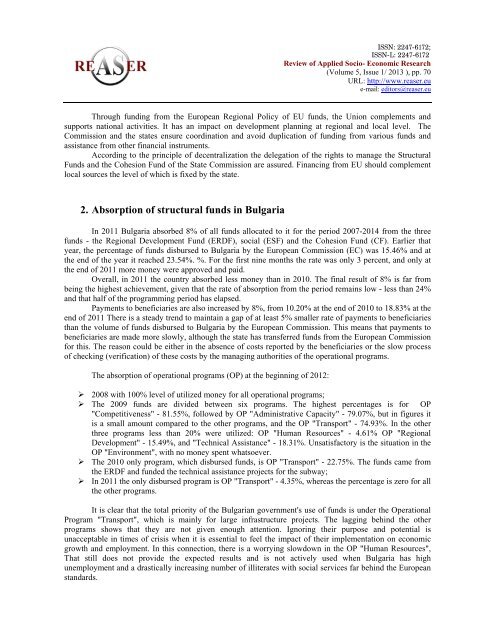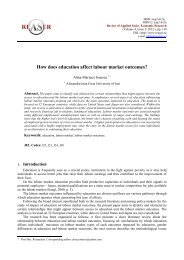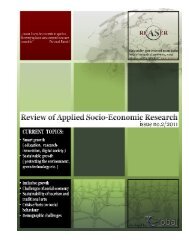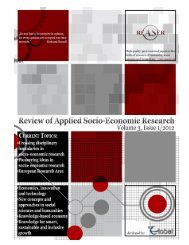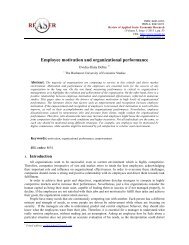new characteristics of inequalities in the information society and ...
new characteristics of inequalities in the information society and ...
new characteristics of inequalities in the information society and ...
Create successful ePaper yourself
Turn your PDF publications into a flip-book with our unique Google optimized e-Paper software.
ISSN: 2247-6172;<br />
ISSN-L: 2247-6172<br />
Review <strong>of</strong> Applied Socio- Economic Research<br />
(Volume 5, Issue 1/ 2013 ), pp. 70<br />
URL: http://www.reaser.eu<br />
e-mail: editors@reaser.eu<br />
Through fund<strong>in</strong>g from <strong>the</strong> European Regional Policy <strong>of</strong> EU funds, <strong>the</strong> Union complements <strong>and</strong><br />
supports national activities. It has an impact on development plann<strong>in</strong>g at regional <strong>and</strong> local level. The<br />
Commission <strong>and</strong> <strong>the</strong> states ensure coord<strong>in</strong>ation <strong>and</strong> avoid duplication <strong>of</strong> fund<strong>in</strong>g from various funds <strong>and</strong><br />
assistance from o<strong>the</strong>r f<strong>in</strong>ancial <strong>in</strong>struments.<br />
Accord<strong>in</strong>g to <strong>the</strong> pr<strong>in</strong>ciple <strong>of</strong> decentralization <strong>the</strong> delegation <strong>of</strong> <strong>the</strong> rights to manage <strong>the</strong> Structural<br />
Funds <strong>and</strong> <strong>the</strong> Cohesion Fund <strong>of</strong> <strong>the</strong> State Commission are assured. F<strong>in</strong>anc<strong>in</strong>g from EU should complement<br />
local sources <strong>the</strong> level <strong>of</strong> which is fixed by <strong>the</strong> state.<br />
2. Absorption <strong>of</strong> structural funds <strong>in</strong> Bulgaria<br />
In 2011 Bulgaria absorbed 8% <strong>of</strong> all funds allocated to it for <strong>the</strong> period 2007-2014 from <strong>the</strong> three<br />
funds - <strong>the</strong> Regional Development Fund (ERDF), social (ESF) <strong>and</strong> <strong>the</strong> Cohesion Fund (CF). Earlier that<br />
year, <strong>the</strong> percentage <strong>of</strong> funds disbursed to Bulgaria by <strong>the</strong> European Commission (EC) was 15.46% <strong>and</strong> at<br />
<strong>the</strong> end <strong>of</strong> <strong>the</strong> year it reached 23.54%. %. For <strong>the</strong> first n<strong>in</strong>e months <strong>the</strong> rate was only 3 percent, <strong>and</strong> only at<br />
<strong>the</strong> end <strong>of</strong> 2011 more money were approved <strong>and</strong> paid.<br />
Overall, <strong>in</strong> 2011 <strong>the</strong> country absorbed less money than <strong>in</strong> 2010. The f<strong>in</strong>al result <strong>of</strong> 8% is far from<br />
be<strong>in</strong>g <strong>the</strong> highest achievement, given that <strong>the</strong> rate <strong>of</strong> absorption from <strong>the</strong> period rema<strong>in</strong>s low - less than 24%<br />
<strong>and</strong> that half <strong>of</strong> <strong>the</strong> programm<strong>in</strong>g period has elapsed.<br />
Payments to beneficiaries are also <strong>in</strong>creased by 8%, from 10.20% at <strong>the</strong> end <strong>of</strong> 2010 to 18.83% at <strong>the</strong><br />
end <strong>of</strong> 2011 There is a steady trend to ma<strong>in</strong>ta<strong>in</strong> a gap <strong>of</strong> at least 5% smaller rate <strong>of</strong> payments to beneficiaries<br />
than <strong>the</strong> volume <strong>of</strong> funds disbursed to Bulgaria by <strong>the</strong> European Commission. This means that payments to<br />
beneficiaries are made more slowly, although <strong>the</strong> state has transferred funds from <strong>the</strong> European Commission<br />
for this. The reason could be ei<strong>the</strong>r <strong>in</strong> <strong>the</strong> absence <strong>of</strong> costs reported by <strong>the</strong> beneficiaries or <strong>the</strong> slow process<br />
<strong>of</strong> check<strong>in</strong>g (verification) <strong>of</strong> <strong>the</strong>se costs by <strong>the</strong> manag<strong>in</strong>g authorities <strong>of</strong> <strong>the</strong> operational programs.<br />
The absorption <strong>of</strong> operational programs (OP) at <strong>the</strong> beg<strong>in</strong>n<strong>in</strong>g <strong>of</strong> 2012:<br />
‣ 2008 with 100% level <strong>of</strong> utilized money for all operational programs;<br />
‣ The 2009 funds are divided between six programs. The highest percentages is for OP<br />
"Competitiveness" - 81.55%, followed by OP "Adm<strong>in</strong>istrative Capacity" - 79.07%, but <strong>in</strong> figures it<br />
is a small amount compared to <strong>the</strong> o<strong>the</strong>r programs, <strong>and</strong> <strong>the</strong> OP "Transport" - 74.93%. In <strong>the</strong> o<strong>the</strong>r<br />
three programs less than 20% were utilized: OP "Human Resources" - 4.61% OP "Regional<br />
Development" - 15.49%, <strong>and</strong> "Technical Assistance" - 18.31%. Unsatisfactory is <strong>the</strong> situation <strong>in</strong> <strong>the</strong><br />
OP "Environment", with no money spent whatsoever.<br />
‣ The 2010 only program, which disbursed funds, is OP "Transport" - 22.75%. The funds came from<br />
<strong>the</strong> ERDF <strong>and</strong> funded <strong>the</strong> technical assistance projects for <strong>the</strong> subway;<br />
‣ In 2011 <strong>the</strong> only disbursed program is OP "Transport" - 4.35%, whereas <strong>the</strong> percentage is zero for all<br />
<strong>the</strong> o<strong>the</strong>r programs.<br />
It is clear that <strong>the</strong> total priority <strong>of</strong> <strong>the</strong> Bulgarian government's use <strong>of</strong> funds is under <strong>the</strong> Operational<br />
Program "Transport", which is ma<strong>in</strong>ly for large <strong>in</strong>frastructure projects. The lagg<strong>in</strong>g beh<strong>in</strong>d <strong>the</strong> o<strong>the</strong>r<br />
programs shows that <strong>the</strong>y are not given enough attention. Ignor<strong>in</strong>g <strong>the</strong>ir purpose <strong>and</strong> potential is<br />
unacceptable <strong>in</strong> times <strong>of</strong> crisis when it is essential to feel <strong>the</strong> impact <strong>of</strong> <strong>the</strong>ir implementation on economic<br />
growth <strong>and</strong> employment. In this connection, <strong>the</strong>re is a worry<strong>in</strong>g slowdown <strong>in</strong> <strong>the</strong> OP "Human Resources",<br />
That still does not provide <strong>the</strong> expected results <strong>and</strong> is not actively used when Bulgaria has high<br />
unemployment <strong>and</strong> a drastically <strong>in</strong>creas<strong>in</strong>g number <strong>of</strong> illiterates with social services far beh<strong>in</strong>d <strong>the</strong> European<br />
st<strong>and</strong>ards.


